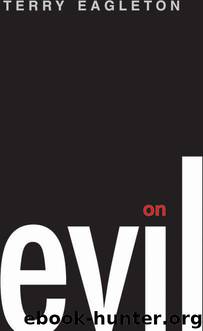On Evil by Terry Eagleton

Author:Terry Eagleton [Eagleton Terry]
Language: eng
Format: epub, mobi, azw3
ISBN: 9780300162767
Publisher: Yale University Press
Published: 2010-12-25T16:00:00+00:00
Like to the Pontic sea,
Whose icy current and compulsive course
N'er feels retiring ebb, but keeps due on
To the Propontic and the Hellespont;
Even so my bloody thoughts, with violent pace,
Shall n'er look back, ’n’er ebb to humble love,
Till that a capable and wide revenge
Swallow them up.
This is the kind of thing that makes the streetwise Iago squirm. He can see such exalted idealism only as bogus, which perhaps in part it is. In Milan Kundera’s terms, then, Othello is angelic whereas Iago is demonic. Othello’s language is too stuffed with mouth-filling rhetoric, too extravagant and hyperbolic. Iago’s speech, by contrast, is coarse and pragmatic. Like a number of other Shakespearian villains, his attitude to language is strictly functional. He speaks scoffingly of the Moor’s discourse as “a bombast circumstance / Horribly stuffed with epithets of war.” For all its malicious intent, this is not a bad description of a hero who can toss of phrases like “exsufflicate and blown surmises.” Even Othello’s final suicide, which he prefaces with a typically sonorous set speech, is what one critic has called “a magnificent coup de théâtre, “ delivered with one canny eye on the audience. This military hero seems to live straight out of an inflated image of himself. Because his identity is so wholly externalised, it leaves a kind of absence or vacuum behind it, which his enemy can then move in on.
From Iago’s viewpoint, Othello represents a pompous plenitude of being which conceals an inner lack. And this lack, ironically, is his inability to see that there is anything lacking in his identity—anything unstable or incomplete about it. His exalted sense of himself is a way of not having to confront the chaos of his inner being. Iago, by contrast, remarks of himself that “I am not what I am”—meaning that while Othello seems more or less identical with his public image as a warrior, his own selfhood is just an empty excess over whatever mask he presents to the world at any given moment. Iago can be defined only in negative terms, as the other of whatever he appears to be. The same goes for his comment that “I am nothing if not critical.” Like a critic, he is parasitic on creation—a creation he secretly despises. Lacking any sturdy identity himself—he is an actor, a purely performative figure—he lives only in the act of subverting the selfhood of others.
So it is that Iago, goaded beyond endurance by Othello’s apparently seamless selfhood, sets out to dismantle it. He begins this demolition process by insinuating an insidious nothing into the heart of the Moor’s identity. Whereas in Macbeth this insidious nothing takes the form of political ambition, in Othello it takes the form of sexual jealousy. Othello asks Iago what is troubling him, to which Iago replies, “Nothing, my lord.” Ironically, this response is exact. There is, indeed, nothing ailing him at all. But Iago rightly speculates that Othello will promptly read some dreadful something— the supposed infidelity of his wife Desdemona—into this modest disclaimer.
Download
This site does not store any files on its server. We only index and link to content provided by other sites. Please contact the content providers to delete copyright contents if any and email us, we'll remove relevant links or contents immediately.
The Secret History by Donna Tartt(16611)
The Social Justice Warrior Handbook by Lisa De Pasquale(11486)
Thirteen Reasons Why by Jay Asher(7783)
This Is How You Lose Her by Junot Diaz(5754)
Weapons of Math Destruction by Cathy O'Neil(5032)
Zero to One by Peter Thiel(4818)
The Myth of the Strong Leader by Archie Brown(4786)
Promise Me, Dad by Joe Biden(4441)
Stone's Rules by Roger Stone(4413)
Beartown by Fredrik Backman(4405)
How Democracies Die by Steven Levitsky & Daniel Ziblatt(4393)
The Fire Next Time by James Baldwin(4338)
100 Deadly Skills by Clint Emerson(4072)
A Higher Loyalty: Truth, Lies, and Leadership by James Comey(4027)
Rise and Kill First by Ronen Bergman(4009)
The David Icke Guide to the Global Conspiracy (and how to end it) by David Icke(3876)
The Farm by Tom Rob Smith(3870)
Secrecy World by Jake Bernstein(3774)
The Doomsday Machine by Daniel Ellsberg(3726)
